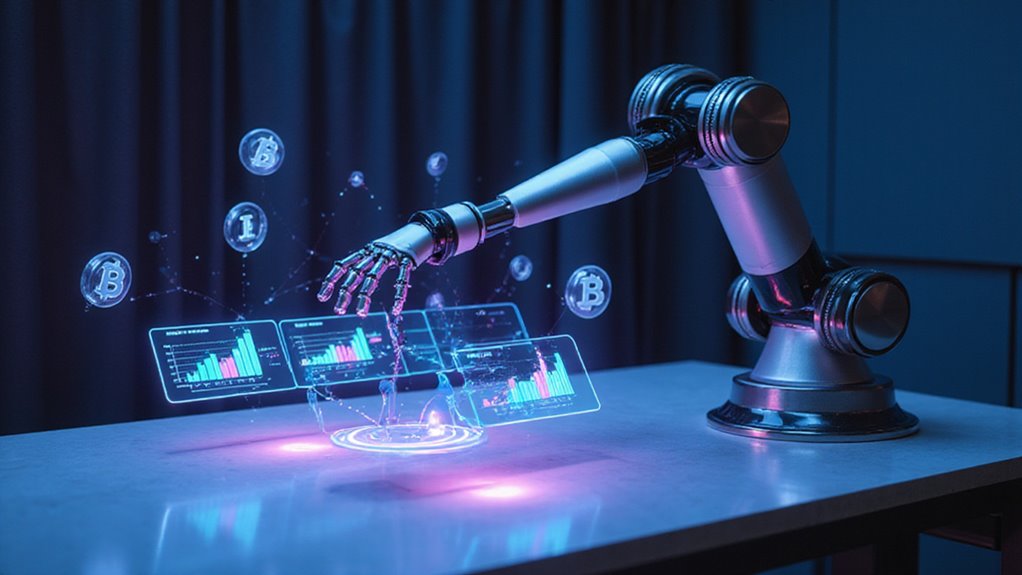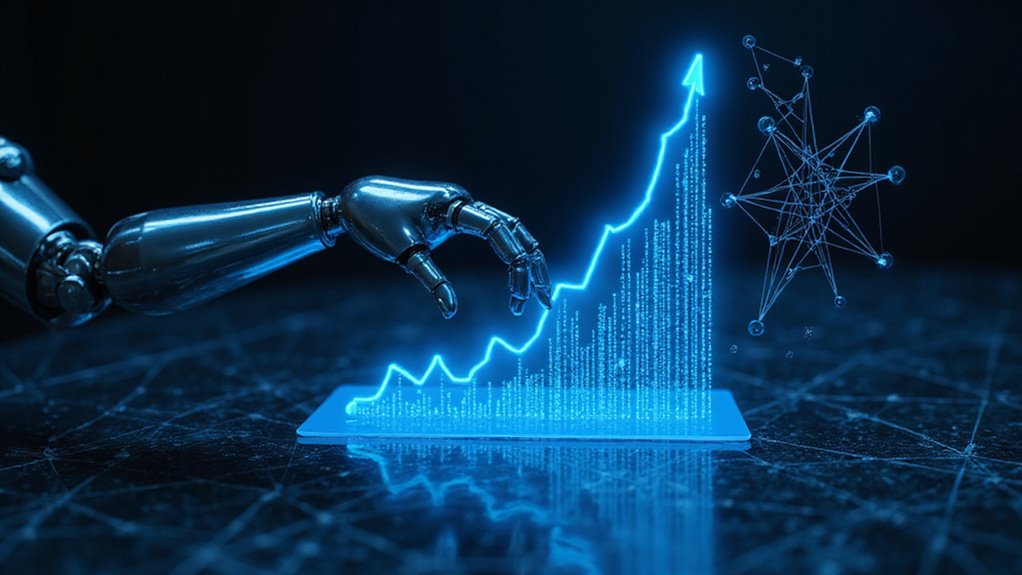Top marketers harness artificial intelligence across five key areas to drive superior results. AI-powered customer segmentation analyzes behavioral patterns to boost marketing ROI by 15%. Predictive analytics forecasts trends with up to 95% accuracy, while automated content creation increases engagement by 70%. Smart chatbots reduce service costs by 30%, and machine learning optimizes ad campaigns for 20-30% better performance. These AI applications represent essential strategies that leading marketers employ to maintain their competitive edge.
Leverage AI-Powered Customer Segmentation for Precision Targeting

While traditional market segmentation relies heavily on basic demographic data, AI-powered customer segmentation enables marketers to analyze vast datasets and identify nuanced patterns in consumer behavior.
Machine learning algorithms can process millions of data points to reveal hidden customer segments based on purchasing habits, browsing behavior, and engagement patterns.
Marketing professionals utilize AI tools to create detailed customer personas that account for psychographic factors, including lifestyle preferences, values, and motivations. These sophisticated segmentation models help companies deliver more personalized marketing messages and product recommendations.
Research from McKinsey indicates that companies using AI-driven segmentation experience up to 15% higher marketing ROI compared to traditional methods. The technology can continuously update customer profiles in real-time, allowing marketers to adapt their strategies while consumer behaviors evolve.
AI segmentation also helps identify micro-segments and niche markets that might be overlooked utilizing conventional analysis methods, leading to more efficient resource allocation and targeted campaign development.
By studying proven marketing tactics, businesses can replicate the success of famous marketers while leveraging AI-powered insights for enhanced results.
Implement Predictive Analytics to Forecast Market Trends
Building on detailed customer segmentation insights, predictive analytics empowers marketers to anticipate future market developments before they occur. Machine learning algorithms analyze historical data patterns to forecast consumer behavior, industry shifts, and emerging opportunities.
Marketing professionals utilize predictive models to identify potential product demand, optimize pricing strategies, and determine the most effective promotional timing. These AI-driven forecasts typically achieve accuracy rates between 85% and 95% when properly implemented.
Dr. Sarah Chen, Chief Analytics Officer at MarketTech Solutions, explains: "Predictive analytics transforms raw data into actionable intelligence, enabling companies to make proactive rather than reactive business decisions."
Organizations implementing predictive analytics report a 25% average increase in campaign effectiveness and a 20% reduction in customer acquisition costs.
The technology examines multiple variables simultaneously, including seasonal trends, economic indicators, and social media sentiment, to generate extensive market forecasts.
Automate Personalized Content Creation at Scale

Artificial intelligence enables marketers to generate customized content for millions of individual customers simultaneously. Advanced AI systems analyze user data and behavior patterns to create tailored messages, product recommendations, and promotional materials that resonate with specific audience segments.
Modern AI content platforms utilize natural language processing to automatically produce variations of marketing copy, email campaigns, and social media posts. These tools can adapt tone, messaging, and creative elements based on demographic profiles and previous customer interactions.
Marketing technology expert Sarah Chen notes, "AI-powered content automation helps brands maintain consistency while delivering personalized experiences at an unprecedented scale."
The technology also optimizes content delivery timing and channel selection for maximum engagement. Machine learning algorithms continuously refine content performance by tracking metrics such as click-through rates, conversion rates, and customer feedback across different audience segments.
Companies implementing AI-driven content automation report up to 70% increased engagement rates compared to generic messaging approaches.
Elite marketing strategies can be effectively replicated using AI tools that analyze and adapt successful campaign elements.
Deploy Smart Chatbots for 24/7 Customer Engagement
Smart chatbots represent another powerful AI application that extends personalized marketing beyond content creation into real-time customer interaction.
These AI-powered systems utilize natural language processing to engage website visitors, answer common questions, and guide potential customers through the sales funnel.
Modern chatbots can analyze customer data in real-time to deliver contextually relevant responses and product recommendations. Research indicates that 64% of consumers appreciate the 24/7 availability that chatbots provide, according to a 2023 Salesforce study.
The implementation of smart chatbots reduces response times and operational costs while maintaining consistent service quality. Companies employing AI chatbots report an average 30% reduction in customer service expenses.
Leading brands like H&M and Sephora utilize chatbots to qualify leads, schedule appointments, and process basic transactions.
These automated systems can handle multiple conversations simultaneously while routing complex inquiries to human representatives when necessary.
Seamless AI integration into the copywriting workflow enhances marketing effectiveness while maintaining authentic customer connections.
Optimize Ad Campaigns With Machine Learning Algorithms

While marketing campaigns have traditionally relied on human intuition, machine learning algorithms now enable data-driven optimization of advertising across digital channels.
These AI systems analyze vast amounts of consumer data to identify patterns and predict campaign performance.
Machine learning algorithms evaluate multiple variables simultaneously, including audience demographics, timing, creative elements, and placement strategies. The technology continuously adjusts campaign parameters based on real-time performance metrics and conversion rates.
Major platforms like Google Ads and Facebook utilize AI to automatically optimize bid strategies and audience targeting. Their algorithms process billions of data points to determine the most effective ad delivery methods for specific business objectives.
Research indicates that AI-optimized campaigns typically achieve 20-30% better performance compared to manually managed alternatives. The technology eliminates human bias and makes rapid adjustments based on statistical analysis rather than assumptions.
Marketing teams can now focus on strategic planning while AI handles the technical complexities of campaign optimization.
Digital strategy replication allows marketers to study and implement successful tactics used by industry leaders.
Frequently Asked Questions
What Skills Do Marketing Teams Need to Successfully Implement AI Tools?
Marketing teams need data analysis skills, basic programming knowledge, strategic thinking, and technical adaptability. Understanding machine learning concepts, data visualization, and cross-platform integration helps maximize AI tool implementation and performance tracking.
How Long Does It Take to See ROI From AI Marketing Investments?
ROI from marketing AI investments typically varies from 3-12 months depending on implementation scope, tool selection, and team expertise. Quick wins may appear within weeks for specific automation tasks and campaign optimization efforts.
Are There Privacy Concerns When Using AI for Customer Data Analysis?
Privacy concerns exist when analyzing customer data with AI. Organizations must guarantee GDPR compliance, secure data storage, transparent collection practices, and obtain proper consent while protecting personally identifiable information from unauthorized access.
Which AI Marketing Tools Integrate Best With Existing CRM Systems?
Popular CRM-compatible marketing tools include Salesforce Einstein, HubSpot's AI features, and Zoho CRM AI. These solutions seamlessly integrate with existing systems while offering predictive analytics, lead scoring, and automated campaign optimization capabilities.